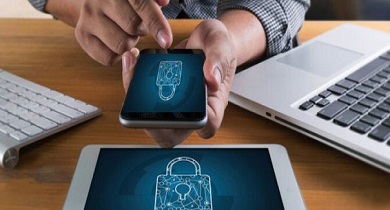How does your Cyber Awareness measure up?


What are your vital statistics?
As a doctor you deal with statistics on a daily basis, collecting and analysing data is second nature to you. The decisions you make at work are based on the results of research. But do you apply this methodology to your home life? If you knew that £16 MILLION1 had been reported in online shopping fraud during lockdown would you analyse this data and then re-evaluate your cyber security at home?
We’ve put the following top ten CYBER AWARE tips and statistics together for all BMA members.
Create a separate password for your email that is not used for anything else. Your personal email is home to so much information about you. The Met Police are running a campaign ‘#threerandomwords’2 which has a ‘how to video’ to create a secure password which will stump the hackers.
Your devices need to be updated regularly. When you receive a notification to update your software be sure to do it as soon as possible. Unfortunately cyber criminals can exploit weaknesses in your apps or software and access your personal data3 if you fail to keep on top of this.
Back up! If your phone, laptop or tablet is stolen make sure you have peace of mind that your photos and important documents are safely backed-up and stored in the cloud or file hosting service.
Educating your children. It may not just be your online presence which is allowing a gateway into your home, the other obvious weak point can be the gaming from within your child’s bedroom. According to the UK government site www.ncsc.gov.uk, an estimated 1.2billion of us are regularly logging on, signing up and playing games online. The moment money or personal data is exchanged online, cybercriminals will be on the hunt to steal your valuable data and potentially access your money.
Re-evaluate how and where you do your online shopping. Pauline Smith, Head of Action Fraud says “It’s important to shop on sites you know and trust. If you’re using a site you’ve not used before, do your research and check reviews before making a purchase. Always be wary of emails, texts and social media posts that offer products for considerably less than their normal price – this is a common tactic used by criminals. Where possible, use a credit card to make online purchases as this will offer you more protection if anything goes wrong.”4 It’s also worth noting that the National Fraud Intelligence Bureau saw £450,000 of fraudulent behaviours reported through Instagram, Paypal and Facebook5 in the single month of June.6
A national campaign offering straight-forward, impartial advice to prevent email, phone-based and online fraud has been launched by the government and UK Finance in the hope to tackle the increase in crimes since Covid-19. ‘Take Five’ is encouraging us all to ‘Stop. Challenge. Protect.’ and by using the catchphrase “My money? My info? I don’t think so!” 7the government is hoping to protect us against financial fraud.
WannaCry Attack of 2017. As a doctor you are no doubt aware of the ransomware attack which locked many NHS Trusts out of their computers costing the NHS £92 million8 . Ciaran Martin, the previous Head of the National Cyber Security Centre said this came close to being labelled the first ever ‘category one cyber event of its time’ and that it was nearly a national emergency9 . The route of the problem was down to the use of old software10 , a lesson for us all to keep our personal software up to date.
Are you being impersonated? The latest figures from the ONS show a dramatic rise in the number of hackers accessing personal accounts. Your credibility (and public image) can be at stake if a hacker breaks your password and posts inappropriate comments on your social media account. ‘Hacking – Social media and email” saw a 55% increase and computer viruses/malware saw a 61% increase.’11
Remember that both IoT (Internet of Things) and IoMT (Internet of Medical Things) are access points for fraudsters. Your IoT’s may be used for seemingly innocuous purposes, be they security cameras, printers, lighting systems or the latest fitness watch, but they are frequently overlooked from a security perspective and it is this vulnerability which you need to protect yourself against. Use different passwords for each item, and save them in a password manager app.
Evaluate your risks. Covid-19 saw a huge surge in cyber crime from the get-go. In the first month of lockdown alone £800,00012 was reported in coronavirus scams. With the threats and dangers becoming more prevalent on a daily basis it’s crucial to be CYBER AWARE. For further information please head to our BMA members advice zone.